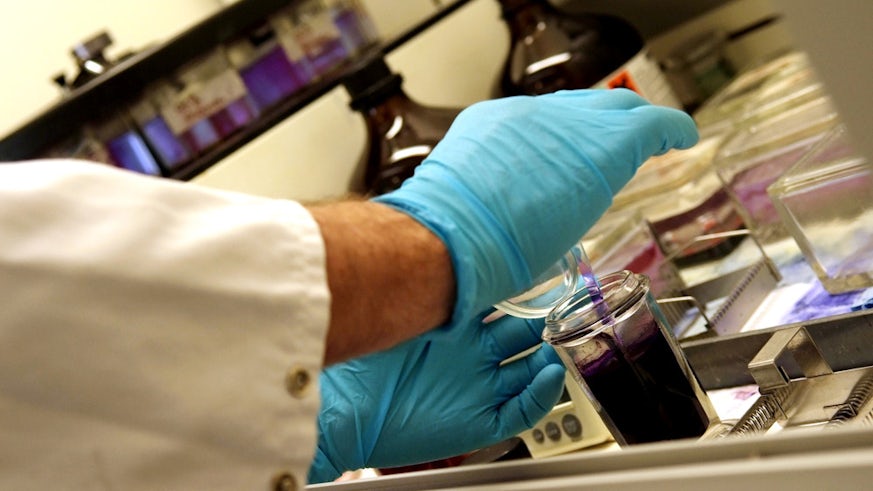Warning over drugs targeting key cancer mechanism
17 January 2017

Scientists have expressed concerns about developing drugs against two molecular targets that had been considered highly promising, after finding that specifically blocking their function adversely affected normal body systems.
The molecular targets CDK8 and CDK19 – members of an important family known as kinases – have a key role in turning on cancer-causing genes and have been implicated in the development of several cancers, including those of the bowel and blood.
But researchers found that specifically blocking the function of CDK8/19 – using highly potent and selective prototype drugs – could not be tolerated in animal studies at doses high enough to have convincing anti-cancer activity in laboratory models of those diseases.
They have shown that blocking CDK8/19 causes too many effects on genes involved in normal cellular function to be viable as cancer treatments – specifically when given continuously at doses needed to block growth of bowel and blood cancers in the lab.
The findings could also have implications for drug development in other medical conditions since CDK8 and19 drugs are being considered as possible drug targets for other types of cancer as well as inflammatory, cardiovascular and viral diseases.
The research has shed important new light on the biology of CDK8 and CDK19 in the body, and will alert researchers around the world to consider very carefully the safety implications of CDK8/19 drugs, or alternatively to refocus their efforts on targets that have potential to be more disease-specific.
Scientists at Cardiff University School of Biosciences, The Institute of Cancer Research, London, and Merck Serono created two highly specific prototype drugs that switch off CDK8/19.
These were used to assess the effect of targeting CDK8 and19 in human bowel cancer cell lines and human bowel tumours grown in mice to determine if there was a ‘window of opportunity’ in which to use potential CDK8/19 drugs effectively and safely – whereby cancers could be arrested while healthy cells were unharmed.
The study was published in the scientific journal eLife, and funded by Merck Serono and the charity Cancer Research UK.
The prototype drugs were designed to be powerful and very specific for CDK8/19, and the researchers were able to show that they did inhibit the activity of these targets inside cancer cells, as intended.
Surprisingly, however, the CDK8/19 inhibitors had only modest impact against the growth of bowel cancer cell lines and tumours grown in mice, although stronger effects were seen in a form of leukaemia blood cancer.
Of particular concern was that, at the levels of exposure tested, the prototype CDK8/19 inhibitors resulted in a mix of unwanted consequences in the body – affecting so-called ‘stem’ cells that replenish damaged or worn-out organs, and causing side-effects in tissues including the gut, bones and the immune system.
The researchers concluded that although CDK8 and CDK19 were ‘druggable’, the new prototype medicines targeted against these proteins were not tolerated at high enough doses needed to shrink the bowel and blood cancers studied. They advised that the drugs targeting CDK8/19 either should not be progressed in humans, or should only be trialled with extreme caution.
Study co-leader Professor Paul Workman, Chief Executive of The Institute of Cancer Research, London, said:
“We designed powerful and highly specific prototype drugs for CDK8 and CDK19, which have allowed us to explore the function of these potential drug targets in cancer and healthy cells in a way that has never been possible before. We were surprised to find that our prototype drugs were not as effective as we’d hoped against the bowel and blood cancers in the lab. And we also found CDK8/19 to play crucial roles in healthy cells in the body – and that with the continuous dosage regimen needed to achieve therapeutic benefit, the prototype drugs caused severe side-effects in animals."
“While these concerns about adverse side-effects and modest anti-cancer effects of CDK8/19 drugs are clearly disappointing, our work sheds critical new light on how CDK8 and CDK19 function in both normal and cancer cells. It’s very important that we share our findings with researchers around the world so that they can choose to either proceed very cautiously with CDK8/19 drugs or alternatively to refocus their efforts on other cancer gene targets. Scientists can also use our prototype drugs to continue to study the role of CDK8/19 in health and disease and potentially to discover currently unforeseen medical uses.”
Professor Trevor Dale of Cardiff University highlighted the scientific benefits such partnerships between academia and industry can bring. He said:
"This academic-industrial partnership is a fine example of how a large multidisciplinary, multi-site team can co-ordinate a complex programme of work which leads to the production of very high quality science."